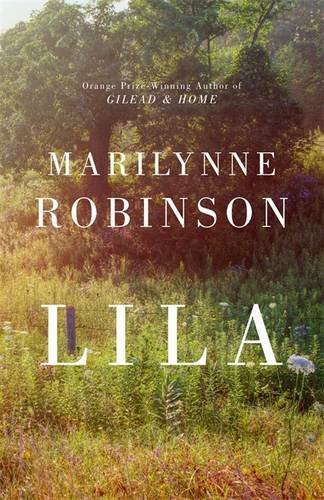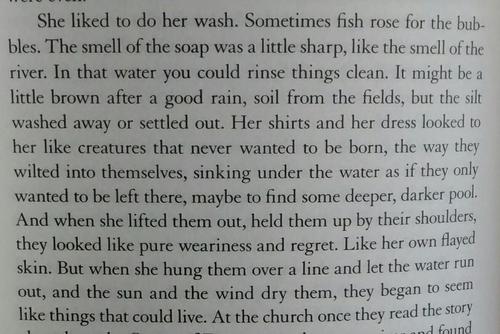
I’ve just finished reading this beautiful book and wanted to share some thoughts on it. I’ve read all of Marilynne Robinson’s novels over the past few years. Before I read them, I remember reading a review of one of them which said something like, I didn’t think people wrote novels like this any more. This really intrigued me – what did it mean? So I read Gilead, then Home, then went back to her earlier Housekeeping. And then I knew exactly what that reviewer meant.
The thing about her novels is that, in my opinion, they have few conventional ingredients of a traditional plot. Now, this is usually a problem for me. I am a bit of a story addict and find the old mythic structures of narrative most satisfying. I find that the main thing that keeps me turning the pages is a good plot, with the proviso that there must be characters that feel real to me and who I care about. With Robinson, the characters are the story; but crucially, the absolutely stunning quality of the prose is what brings me back to her novels every time. It’s not a case of – Mm, I wonder what will happen next? Yes, there are a few small mysteries and secrets to be solved in her novels, and there are tensions to be resolved. But these are minor for me in comparison to the sheer beauty of her words. The pleasure gained from reading a wordsmith of this calibre is rare indeed and feels like a privilege. Someone asked me once what Gilead was like and I remember having difficulty framing an answer, and could only come back with one word foremost in my mind: reading it was like a benediction.
Now I’m not a religious person, but reading those books really does feel like a blessing. I loved spending time in the company of John Ames in Gilead; hearing about the lives of Glory and Jack Boughton (whose father is a dear old friend of Ames) in Home; and finally seeing events from the point of view of Ames’ much younger wife Lila in the third novel of the trilogy. Yet despite that fact that all three novels tread the same ground in some ways, there is so much more to see in each retelling, that of the deeply personal experience of each individual mind (and soul) of these four people linked by family, friendship and marriage. Perhaps another writer might have truncated each retelling and shoved them all together into one novel, but for me that would have lost the power and space of choosing to allow a full novel’s length for each story.
In Lila, the story follows the upbringing of a girl from a deeply mean background and charts her journey towards her arrival in Gilead where she meets her future husband Ames. It is not a conventional love story – beautifully touching though that relationship is – yet rather is the description of the creation of a person, from earliest memories to the fruition of becoming a mother herself. Her desperate childhood is expressed only through memories and thoughts – she tells little or nothing of it to anyone – giving voice to the voiceless, the very poorest of American society, and thereby revealing a silent yet mighty shadow upon the myth of the American dream.
The writing itself is a rare and unique vision of incredible clarity, one which imbues the world and all that is in it with a luminosity and truth. Here is one such passage, that describes something so humble as washing clothes, yet fills it with vibrant life:

I find myself unable to compare Robinson with another writer, as her style is so her own, her subject matter so peculiarly Robinson, her creation of the Ames and Boughton families as real to me as the Cazalets in Howard’s novels or even the Earnshaws in Bronte.
Finally, I would say if a gripping plot is your thing, then Robinson may not be the novelist for you, but if you don’t mind so much about that now and again, and you want to be uplifted and transported by beatific prose, she’s your gal.